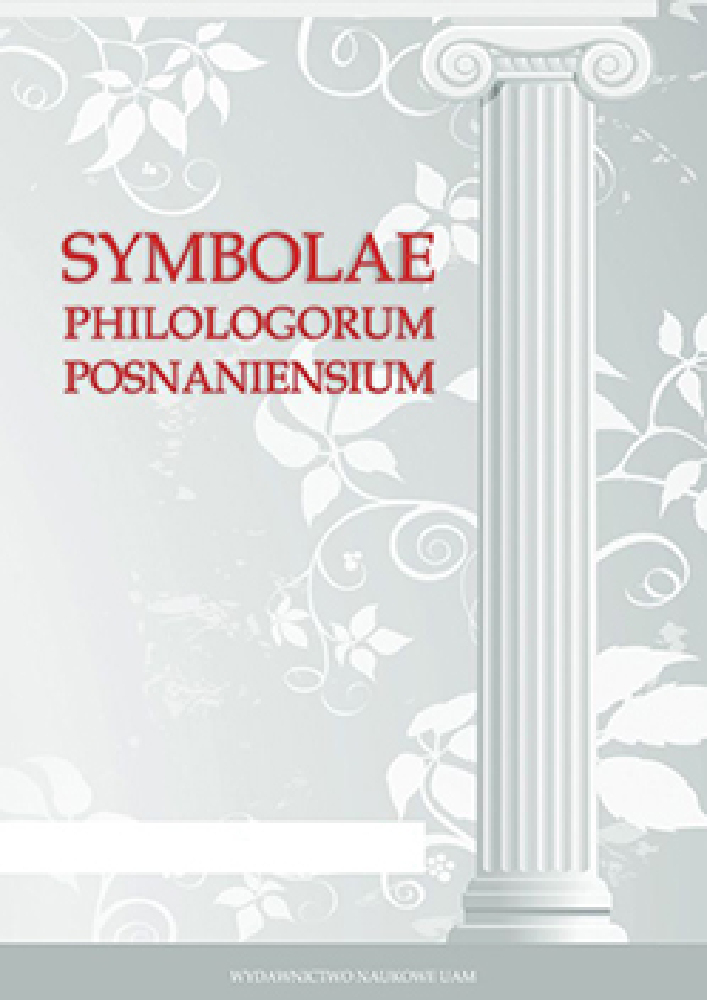Abstrakt
The article shows the Horatian ode III 26 on the background of the votive epigram and in reference to the custom and at the same time the topos of „winning” by violence the house of a lover (frangere postes) and the way of imitating this ode by Filip Buonaccorsi Kallimach in the XXVII elegy and by Jan Kochanowski in the elegy II 11 (in the version preserved in the so-called Osmólski’s manuscript). Callimachus had the text of the ode with the lesson of vestes in verse 7, Kochanowski with the lesson of vectes. As a consequence, in Kallimach’s elegy there is no topos of breaking the door, but the motif of the victorious militia amoris remains, while Kochanowski uses the topos of frangere postes, but departs with love, Lydia and the goddess Venus not with the satisfaction of a victorious soldier, but similarly to Propertius in anger and with a feeling of experienced harm.
Bibliografia
Źródła, przekłady, komentarze
Anthologie grecque. Première partie: Anthologie Palatine, vol. II Livre V, texte établi et traduit par P. Waltz et J. Guillon, 19903; vol. III Livre VI, texte établi et traduit par P. Waltz 1960.
Aristophanis, Comoediae, ed. Th. Bergk, vol. I, Lipsiae 1895, vol. II Lipsiae 1892.
Callimachi Experientis (Philipi Bonaccorsi), Carmina, a cura di F. Sica con introd. di G. Paparelli, Napoli 1981.
P. Callimachi Experientis, Elegiarum libellus, MS Lat. Medii Aevi 367, Bibl. Musaei Nat. Hungarici, Budapest.
Callimaque, Les Origines […] Hymnes, texte établi et traduit par É. Cahen, Paris 1972.
Cassio Dione, Storia Romana, introd. di G. Traina, trad. e note di G. Norcio, vol. IV, Milano 2005.
Cornelii Taciti, Libri qui supersunt, quartum rec. C. Halm, vol. I: Ab excessu divi Augusti, Lipsiae 1898.
C. Valerius Catullus, hrsg. und erkl. von W. Kroll, Leipzig 1929.
Die Elegien des Sextus Propertius, erkl. von M. Rothstein, II Teil, Berlin 1898.
Ioannis Cochanovii, Elegiarum libri duo, MS IV 3043, Bibl. Nationalis, Varsovia.
A. Gellii, Noctes Atticae, rec. P.K. Marshall, vol. I, Oxonii 2004.
Herondae Mimiambi, iterum ed. O. Crusius, Lipsiae 1894.
Q. Horatius Flaccus, Oden und Epoden, erkl. von A. Kiessling, 6e Aufl. ern. von R. Heinze, Berlin 1917.
Q. Horati Flacci, Opera, ed. S. Borzsák, Leipzig 1984.
K. Janicki, Carmina. Dzieła wszystkie, wstęp i oprac. J. Krókowski, przeł. E. Jędrkiewicz, wstęp II, komentarz i oprac. J. Mosdorf, Wrocław 1966.
J. Kochanowski, Carmina Latina. Poezja łacińska, red. Z. Głombiowska, pars I–III, Gdańsk 2008–2013.
T. Lucreti Cari, De rerum natura libri sex, rec. J. Martin, Lipsiae 1969.
P. Ovidius Naso, Carmina amatoria, ed. A. Ramírez de Verger, Monachii et Lipsiae 2003.
A. Persi Flacci et D. Iuni Iuvenalis, Saturae, ed. W.V. Clausen, Oxonii 1992.
R. Plenkiewicz, Jan Kochanowski, jego ród, żywot i dzieła, w: J. Kochanowski, Dzieła wszystkie. Wydanie pomnikowe, t. IV, Warszawa 1896 (tu trzy elegie z rękopisu Osmólskiego oraz fragmenty innych).
Poetae Latini Minores, post Ae. Baehrens iterum rec. F. Vollmer, vol. I: Appendix Vergiliana, Lipsiae 1910.
Sex. Propertii, Elegiarum libri IV, iterum ed. C. Hosius, Lipsiae 1922.
Sexti Properti, Elegiarum libri IV, ed. P. Fedeli, ed. corr. Stutgardiae et Lipsiae 1994.
Remains of old Latin. Lucilius. The Twelve Tables, ed. and transl. by E.H. Warmington, Cambridge, Mass. 1998.
G.E. Senger, Dwie pietierburgskija rukopisi latinskich stichotworienij Jana Kochanowskogo, Zapiski Impieratorskoj Akadiemii Nauk Istoriko-Fiłoł. Otdielenija, S. 8, 7/1, Sankt Petersburg 1905.
Suétone, Vies des douze Césars, texte établi et traduit par H. Ailloud, vol. II, Paris 1993.
Teocrito, Idilli e epigrammi, introd., trad. e note di B.M. Palumbo Stracca, Milano 2004.
P. Terenti Afri, Comoediae, rec. C. Dziatzko, Lipsiae 18842.
Tibulli aliorumque, Carminum libri tres, rec. I.P. Postgate, Oxonii 1915.
Tibullo, Le Elegie, a cura di F. Della Corte, A. Mondadori editore 2000.
P. Vergili Maronis, Opera, rec. R.A.B. Mynors, Oxonii 1969.
Opracowania
Barycz 1935: H. Barycz, Historia Uniwersytetu Jagiellońskiego w epoce humanizmu, Kraków 1935.
Domański 1966: I. Domański, De Philippo Callimacho elegicorum Romanorum imitatore, Wrocław 1966.
Głombiowska 1981: Z. Głombiowska, Elegie łacińskie Jana Kochanowskiego. Dwie wersje, Warszawa 1981.
Goleniszczew-Kutuzow 1970: I. Goleniszczew-Kutuzow, Odrodzenie włoskie i literatury słowiańskie, przeł. W. i R. Śliwowscy, Warszawa 1970.
Kumaniecki 1953: K. Kumaniecki, Twórczość poetycka Filipa Kallimacha, Warszawa 1953.
Luck 1961: G. Luck, Die römische Liebeselegie, Heidelberg 1961.
Syndikus 1972–1973: H.P. Syndikus, Die Lyrik des Horaz. Eine Interpretation der Oden, Band I–II, Darmstadt 1972–1973.
Ulewicz 1999: T. Ulewicz, Iter Romano-Italicum Polonorum czyli o związkach umysłowokulturalnych Polski z Włochami w wiekach średnich i renesansie, Kraków 1999.
Licencja
Prawa autorskie (c) 2021 Zofia Głombiowska

Utwór dostępny jest na licencji Creative Commons Uznanie autorstwa 4.0 Międzynarodowe.
